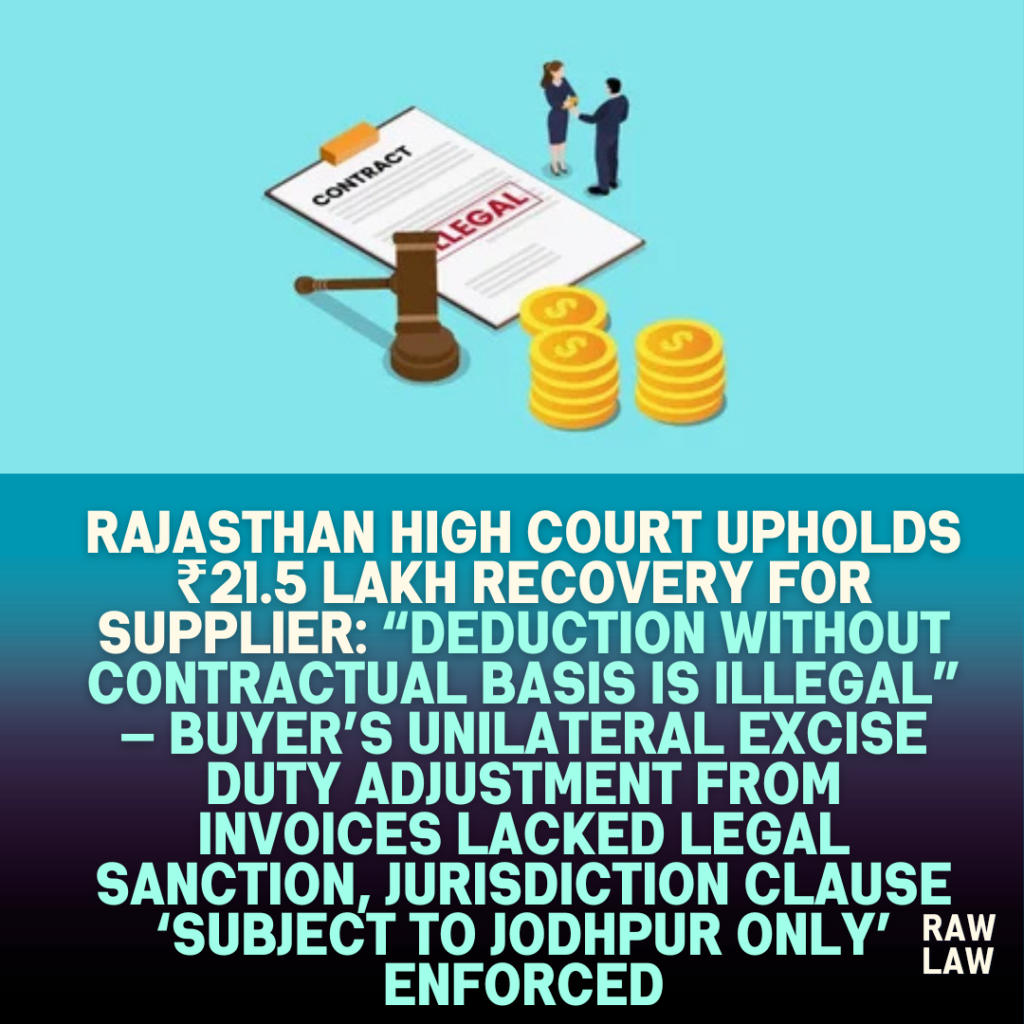Court’s Decision
The Rajasthan High Court dismissed the appeal filed by the defendants, thereby affirming the District Court’s decree in favour of the plaintiff for recovery of ₹21,50,378 with 9% annual interest. The Court held that the defendants’ deduction of ₹15,75,340 from two invoices (Invoice Nos. 5 and 6) was illegal as there was no contractual provision authorising such deduction. It further held that the District Court’s appreciation of oral and documentary evidence was correct, lawful, and required no interference. The appeal and the connected stay petition were rejected.
Facts
The plaintiff, operating under a proprietary firm, was engaged in manufacturing prefabricated steel structures and supplying them to the defendants, a registered company dealing in mobile towers. On 8 February 2007, the defendants issued a purchase order for 160 telecom shelters, split into 100 units at ₹82,000 per unit and 60 units at ₹67,000 per unit, with a 30-day payment term.
The plaintiff supplied the goods under Invoice Nos. 5 and 6 totalling ₹16,00,984. The defendants, however, paid only ₹25,644 after deducting ₹15,75,340, citing adjustments for excise duty and taxes. The plaintiff repeatedly demanded payment but received only part-payment via cheque on 14 March 2008. A legal notice was sent on 30 May 2007, acknowledged by the defendants, but full payment remained pending.
The plaintiff sued for recovery of ₹21,50,378 (principal plus 12% interest). The defendants contended that the plaintiff had incorrectly calculated excise duty and that deductions were permissible under prior agreements.
Issues
- Whether the defendants were entitled to deduct ₹15,75,340 from Invoice Nos. 5 and 6 without contractual authority.
- Whether the District Court correctly appreciated oral and documentary evidence in decreeing the suit.
- Whether the suit was within territorial jurisdiction.
- What rate of interest was justified.
Petitioner’s Arguments (Appellants/Defendants)
The defendants argued that the plaintiff wrongly included excise duty in the invoices and that under previous purchase orders, the calculation should have been separate. They claimed to have issued debit notes and adjusted the amount accordingly. They also questioned the jurisdiction of the Jodhpur court, contending that the cause of action arose elsewhere. They alleged that certain documents relied upon by the plaintiff were fabricated or unauthorised, and that no full and final settlement had occurred.
Respondent’s Arguments (Plaintiff)
The plaintiff contended that the deduction was wholly illegal as no purchase order, including Invoice Nos. 5 and 6, permitted such unilateral adjustment. The plaintiff argued that excise duty was correctly charged as per practice and was separately remitted to the department. It was submitted that the defendants’ own witnesses admitted receiving the goods and that the debit notes had no contractual foundation. The plaintiff maintained that the territorial jurisdiction clause on the invoices and purchase orders conferred jurisdiction on the Jodhpur court.
Analysis of the Law
The Court analysed the purchase orders, invoices, and correspondence, noting that neither the master purchase order nor the relevant invoices contained any clause authorising deductions for excise duty from agreed prices. The defendants’ claim that they could adjust amounts was unsupported by the contract. The Court emphasised that under the Indian Contract Act, deductions from an agreed contractual amount must be expressly authorised or mutually agreed upon.
The Court also referred to the jurisdiction clause “Subject to Jodhpur Jurisdiction Only” printed on both invoices and purchase orders, which was held binding between the parties, affirming the trial court’s jurisdiction.
Precedent Analysis
The judgment relies on general principles from precedents that unilateral deductions without contractual sanction are impermissible and that agreed jurisdiction clauses are enforceable. Although no specific case names are detailed, the ruling aligns with established contract law precedents where courts have disallowed arbitrary adjustments contrary to written terms.
Court’s Reasoning
The Court found the trial court’s reasoning sound:
- Invoice Nos. 5 and 6 were for goods duly supplied, and deductions of ₹15,75,340 were made without contractual basis.
- The defendants’ own witness admitted that all other invoices had been fully paid except for these two.
- The documentary evidence, including debit notes, lacked authenticity and were unsupported by signed agreements.
- The “Subject to Jodhpur Jurisdiction Only” clause validly conferred jurisdiction on the trial court.
- Interest at 9% p.a. was reasonable in the absence of proof for 12% p.a.
The High Court concluded that the trial court had properly evaluated the oral and documentary evidence and found no reason to interfere.
Conclusion
The appeal was dismissed, affirming the decree in favour of the plaintiff for ₹21,50,378 with 9% interest. The connected stay petition was also rejected. The Court held that deductions made without contractual basis were illegal and that the trial court’s appreciation of evidence was correct.
Implications
This judgment reinforces that in commercial transactions, parties cannot unilaterally alter agreed payment terms without express contractual authority. It underscores the enforceability of jurisdiction clauses in contracts and invoices. Businesses must ensure any deductions from invoices are contractually sanctioned, failing which courts may order full recovery with interest.
FAQs
Q1. Can a buyer deduct amounts from an invoice without contractual authority?
No. The Court reiterated that deductions from agreed prices without a contractual clause permitting them are illegal and recoverable.
Q2. Does a jurisdiction clause on an invoice hold legal weight?
Yes. When printed on invoices and agreed between parties, such clauses are binding and determine the competent court for disputes.
Q3. How does the Court determine the applicable interest rate in such recovery suits?
In the absence of an agreed rate, the Court applies a reasonable rate based on prevailing commercial practices—in this case, 9% per annum.



